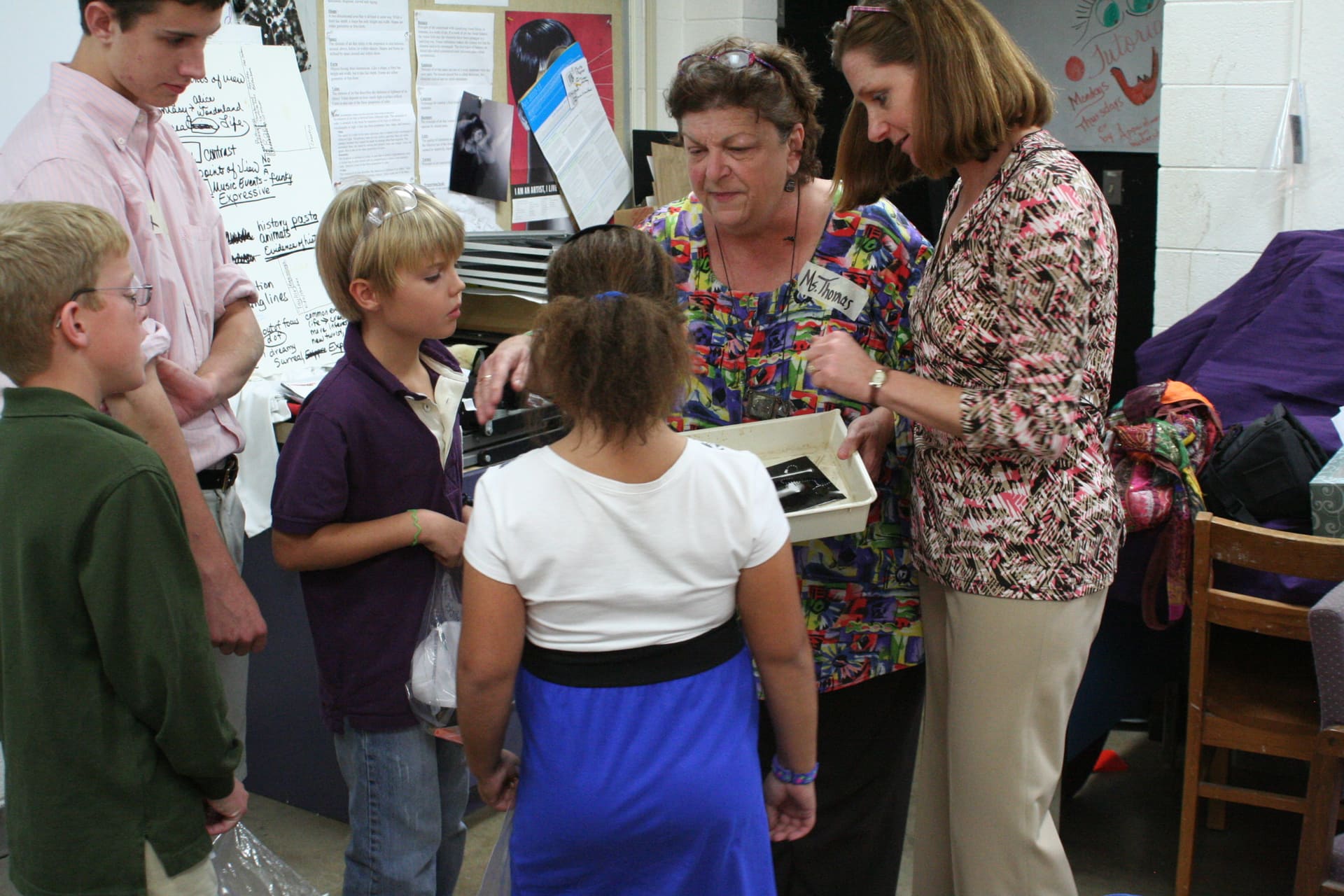How do you choose the right school for your child?
By Kristen Ring, Director of the Multisensory Academy of Practitioners at Forsyth Country Day School
Have you ever heard anyone say, “My children are all EXACTLY the same”? Aside from it being creepy in a Brave New World kind of way, it is also simply a ludicrous thought. I have three children who are wonderfully unique. There are days when I am astounded by how incredibly dissimilar they are. Naturally, they will have varying needs throughout many aspects of life, and we as parents are charged with finding the best means of meeting those needs. Determining the appropriate school choice and charting an individualized plan for each child within that school can be a daunting task for many parents. Some question if it is even feasible. I assure you, with some thoughtful planning, it is.
The traditional school model is an archaic form designed in the post Industrial age to reflect an era of mass production. Envision rows of round pegs in long straight lines. I don’t know about your children, but my kids seem more like square pegs, or perhaps ovals on a good day. This model doesn’t adequately maximize the potential of each child. While I dislike labels for children, they will help to demonstrate my point. My oldest son falls into a growing population of students – his file claims he is HAG / ADD. His brain is the slickest of foxes, but there is no telling which rabbit he will chase or where he will end up – or quite frankly if he will give up the hunt because someone offers him a sandwich. It is maddening as a parent to have a child who is extremely bright but often forgets to tie his shoes. It is also scary to think about his educational journey.
 Fewer and fewer kids thrive in a traditional learning environment in which the teacher is the great disseminator of all knowledge and the children are expected to sit quietly and absorb, proving mastery by regurgitating facts. The paradigm has certainly changed and the new educational model reflects the critical need for graduates to compete globally. The buzz in education currently is the teaching of “21st Century Skills”. In a nutshell, this means the emphasis is in teaching kids to think critically and creatively, while encouraging them to be technologically savvy and work well with others. These are all good things. Kids absolutely must be actively engaged in the learning process, as they are taught to develop initiative and academic curiosity.
Fewer and fewer kids thrive in a traditional learning environment in which the teacher is the great disseminator of all knowledge and the children are expected to sit quietly and absorb, proving mastery by regurgitating facts. The paradigm has certainly changed and the new educational model reflects the critical need for graduates to compete globally. The buzz in education currently is the teaching of “21st Century Skills”. In a nutshell, this means the emphasis is in teaching kids to think critically and creatively, while encouraging them to be technologically savvy and work well with others. These are all good things. Kids absolutely must be actively engaged in the learning process, as they are taught to develop initiative and academic curiosity.
 Schools need to cultivate world class skills in each student while delivering rich content. It is a dynamic, if not symbiotic, relationship that demands a great deal from teachers. But how, as parents, do we determine which schools are doing the best job of meeting a child’s current needs while preparing him or her for the future? Adding to the complexity of this, how do we do it for all of our children, whose unique personalities are also reflected in their distinctive learning styles? Seems like quite a task. Thankfully, we live in a community blessed with incredible academic resources for everyone on the learning continuum. The key is not being afraid to ask questions. Tour schools and spend a significant amount of time at each one. Visit classrooms, and go into the cafeteria DURING lunch, not when it is empty! It is amazing what a busy school cafeteria will reveal about the atmosphere of a school. Attend extracurricular events as well.
Schools need to cultivate world class skills in each student while delivering rich content. It is a dynamic, if not symbiotic, relationship that demands a great deal from teachers. But how, as parents, do we determine which schools are doing the best job of meeting a child’s current needs while preparing him or her for the future? Adding to the complexity of this, how do we do it for all of our children, whose unique personalities are also reflected in their distinctive learning styles? Seems like quite a task. Thankfully, we live in a community blessed with incredible academic resources for everyone on the learning continuum. The key is not being afraid to ask questions. Tour schools and spend a significant amount of time at each one. Visit classrooms, and go into the cafeteria DURING lunch, not when it is empty! It is amazing what a busy school cafeteria will reveal about the atmosphere of a school. Attend extracurricular events as well.
 Sit down with the appropriate administrator and ask as many questions as it takes until you feel like you have a true sense of the school’s ability to meet the needs of each of your children. Here are a few suggestions:
Sit down with the appropriate administrator and ask as many questions as it takes until you feel like you have a true sense of the school’s ability to meet the needs of each of your children. Here are a few suggestions:
1) How many kids are in each class? This is a critical component in my opinion!
2) Describe the course of study and my child’s exposure to special areas – such as foreign language, music, art, physical education, technology, etc.
3) How is the instruction differentiated to meet the needs of every student in the classroom?
4) What are the various methods of assessing student growth and development?
5) How is technology infused into the daily lessons?
6) How does this school compare to peer schools in terms of standardized testing?
7) What is the average teacher load – meaning how many students does a teacher work with each day, which helps to determine how much time they ultimately have for each student. How much feedback do parents get throughout a quarter from each teacher?
8) Are students prepared fully for college? What percentage of students are accepted into their first choice college? What is the college counselor to student ratio?
9) How robust are the athletic programs? When can students begin to participate in interscholastic sports? How robust are the Arts programs?
10) Is the school safe? What are potential issues in this realm that a student might experience?
Our area has phenomenal educational resources. If your student needs an educational evaluation, include the psychologist in the discussion about school choice. Remember that kids will make friends wherever they go, so choose a school that can promote the best in each child. Good luck!
